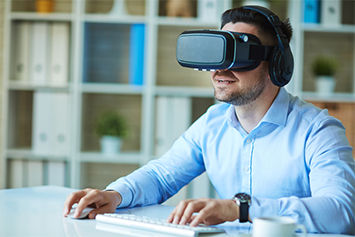Virtual reality (VR) and augmented reality (AR) have long been considered potential game-changers for training. The ability to simulate various scenarios that are difficult or expensive to replicate in real life has the potential to simultaneously improve training outcomes and lower costs.
VR Training in Law Enforcement
According to a report by Lester Holt for NBC News, the Los Angeles police department (LAPD) has recognized the potential value of VR technology in training its officers for the wide variety of situations they may encounter when policing the nation’s second-largest city. The technology being used by the LAPD makes use of motion-capture technology to allow human participants to act out the motions of the virtual characters they interact with, adding the ability to ad lib and modify the behavior of the training characters midstream.
The VR equipment being used by the LAPD also allows trainers to take various biometric measurements, including heart rate, stress levels, and even eye movements. This means trainers can identify situations that may be particularly troubling for trainees and work with them to better manage that stress or help them learn to work effectively under such conditions and avoid potentially lethal mistakes and errors in judgment.
Virtual Simulations Can Aid Real-Life Encounters
Holt notes that the introduction of VR training comes at a time of intense nationwide police scrutiny over issues like the use of force in interactions with members of the public. Rather than learning hard lessons about the use of force after an encounter happens in real life, trainees can be put through virtual simulations of such encounters multiple times in a virtual environment, where the stakes are obviously much, much lower.
VR and AR technologies continue to improve in quality and become more economical. For industries and professions that involve difficult, expensive, or dangerous activities, VR and AR can be great options for ensuring trainees get the number of repetitions and amount of practice needed to operate smoothly and competently in the real world without the challenges of simulating such challenging experiences in real life.
What implications—and applications—might VR training have in your organization?
Lin Grensing-Pophal is a Contributing Editor at HR Daily Advisor.

